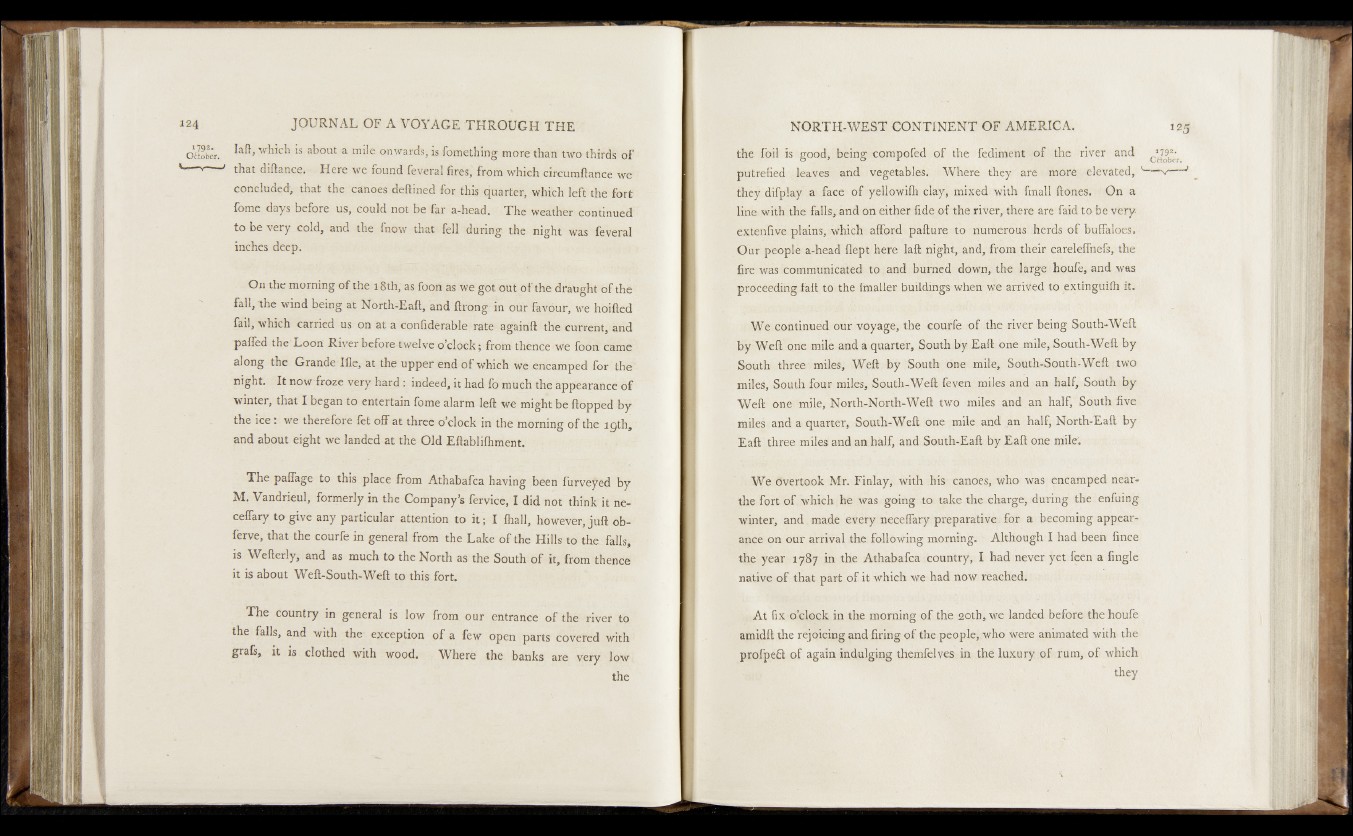
o\lobfer. which is about a mile onwards, is fomething moré than twothireHrof
— — * that diftancq. Here we found feveral fires, from which cifcuraftance we*
concluded, that the canoes deftined for this quarter, which leffe’thedort'
fome days before us, could not be far a-head, The weather continued
to be very cold, and the fnow that fell during the night was feveral
inches deep.
On the morning of the 18th; as foon as we got‘out of the draught of thè~
fall, the wind being at Nofth-Eaft,-and ftrbrig-in oü’r faypuf, we hóifted
fail, which carried us-on at a confidèrable rate - aghinfl: the current,’and
palfed the'Loon River befor&twelve o’clock; from thènce-We foêrT'came
along the Grande Me, at the upper end of 'which we encamped? for ^ thé'
night. It now froze very hard; indeed, it- had fo much the appéaraneé ó f
winter, that I. began to entertain fome alarm-left we might be flopped "by
the ice: we therefore fet off at three o’clock in the morning of the 19 th,
and about eight we landed at the Old Eftablifhment.
The paffage to this place from Athabafcahaving been furvejfod --By
M. Vandrieul, formerly in the Company’s fervice, I did not think it ne.
ceffary to give any particular attention to it; I fhall, however;Juft ob-
ferve, that the courfe in general from the Lake of the Hills-to the ■ falls*
is Wefterly,.and as much to the North as the South of-it, from’t ó ë e
it is about Weft-South-Weft to this fort.
The country in general is low from our entrance of the river to
the falls, and with the- exception of a few open parts covered with1
grafs* it is clothed with wood. Where the banks are very low
the
the foil -is good,: ibeing^compofed* o f the' fedifoeht >ofi the -river and
putrefied / foav.es and vegetables* »■ Where < they ’ •ard s more - elevated, *-*w—
they difplay' at face ■ o f”yeMowilh clriy, mixed' with, finalf fldnes. /h©n a
linewith the fall's; and on either fidqbf the river,- there, are faid to be very-
extenfive plains, which: afford. pafl.ure'?to • numerousvherds of buffaloes.
Our people.arhead flept here laft night, and/from^their careleffnefs,, the
fire* was communicated' to ».and burned- down/the forge houfe, and was
proceedingsfaft to the fmallerfouildingS'wherr we arrived to extinguifh it.
■ We. continued our/voyage,-the courfe 'ofdhe river being South-Weft
by Weft one mile and a quarter, Southby Eaft: one?mile/South-Weft by
South three 'miles, Weft by'South one mile, South-SouthrWeft I two;
mileS/,Squthfoup miles,-;South-Wefb feven miles and'an half/s South 'by
Weft one^mile,, North-North-Weft two miles .and-an half,' South,-ffvej-
mffcfeaud avquarter, South-Weft one mile and/an foalf; North-Eaft by
Eaftltbree miles and an half, and South-Eaft by Eaft one mile. .
h We &vertook Mr. Finlay, with, his-" canoes; .who* was encamped near-
the fort o f which; he was going, .toi'take the.charge, during, theienfuing
winter, and tmade every neceflary;preparafcive. for ^becoming appearance
on our arriyal the following mosning. Although I had- been finGe
the year 1787 in the Athabafcavcountry,.I hadmever.^et.feen a fingle
native of that part of.it which we-had no^ reached^; 1
^ At fix o’clock in the morning of the <2otb, We landed before- the houfe
amidft the rejoicing and firing of the people/who were animated with the
profpe£l of again indulging theixifelvPSs in the luxury :of rum, of which
they